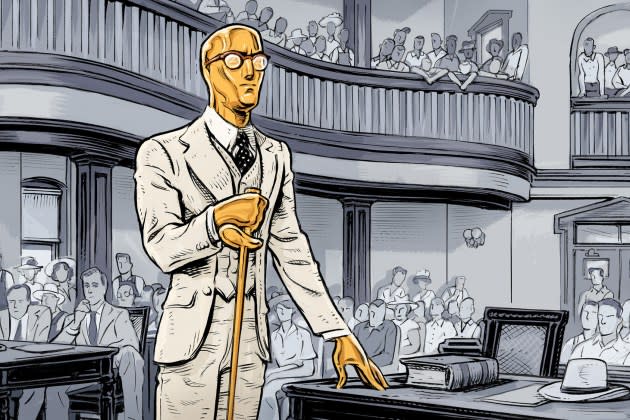This Oscar Headline Might Get Us Sued

If tradition holds, at some moment during this year’s Oscar telecast, the Academy of Motion Picture Arts and Sciences will dutifully thank its team of ballot-tabulating accountants at PricewaterhouseCoopers. But when it comes to the sheer number of billable hours racked up, the Academy might want to give a shout-out to its team of lawyers, too. They’ve certainly earned it over the years.
At some point, you’ve probably noticed that whenever you see the word “Oscar” in print or a representation of the organization’s gold statuette of a sleek, sword-gripping knight standing atop a reel of film, it is accompanied by an R within a circle. (As a member of the media, THR is in the clear.) That’s because in 1975, AMPAS registered the Oscar image as a trademark. Four years later, in 1979, it went a step further with its crackdown, trademarking the use of the words “Oscar” and “Academy Awards.” Why? It seems that too many companies were playing fast and loose with everybody’s favorite golden boy and misusing his likeness and name to enhance their brands.
More from The Hollywood Reporter
2024 Oscars Ties Record for Most Women Nominees, With 32 Percent
Follow That Envelope! What Happens to the Cards That Reveal the Oscar Winners?
This is strictly verboten. According to the Academy Awards’ website, protecting the intellectual property behind the Oscars is more important than ever: “Their prestige, long acknowledged within the motion picture industry, has grown over the years because the public recognizes the Oscar as an award based solely on artistic and technical achievement and because care has been taken to preserve the integrity of the Oscar symbol.”
While the trademark has been in effect for coming up on 50 years now, it’s only been in the past few decades that the Academy has gotten aggressively litigious about these incidents of copyright infringement. Since then, no target has proved out of bounds to slap a suit on, whether it’s the mighty U.S. Postal Service claiming that it had “Oscar-quality service” or some mom-and-pop confectioner in North Hollywood who made the mistake of creating chocolate statuettes for a studio executive client. Size doesn’t matter, because the Oscar narcs are watching … and they like to sue.
Over the years, the Academy has taken legal action against such corporate heavy hitters as Royal Caribbean, Saatchi & Saatchi and Prince Sporting Goods after the companies used direct references to the Oscar to tout their own products. In most cases, this results in an immediate takedown of the offending bit of advertising and/or cash settlements. But in certain instances where the offender proves to be more stubborn, AMPAS has shown that it is ready and willing to go before a judge — even if it doesn’t win.
In 2005, the Academy sued Italian TV broadcaster RAI for using the word “Oscar” while promoting awards shows on its networks such as the fashion Oscars, the sports Oscars and the “Oscar del Vino.” After three years (and who knows how much in lawyers’ fees), the trademark infringement motion was denied by the U.S. District Court, Central District of California. In 2010, the Academy sued GoDaddy for cybersquatting because the company was selling internet domain names that were “confusingly” similar to AMPAS trademarks, such as 2011Oscars.com. The Academy was seeking $100,000 in statutory damages for each case of infringement, which, according to court papers, would have totaled more than $29 million. This time, the battle lasted five years. And again, the judge ruled against the Academy, arguing that it could not prove that GoDaddy had “acted in bad faith.”
But if you’re starting to get the impression that poor Oscar’s legal efforts have been quixotic, think again. In 2014, AMPAS filed suit against a Texas man who was manufacturing, importing and selling fake statuettes on eBay and Etsy. This time, the court ruled in the Academy’s favor, ordering the man to pay $375,000 in damages for copyright and trademark infringement.
Even Oscar winners have to look both ways before crossing the Academy. There are strict regulations about who may or may not sell an Oscar, and also to whom and for how much. To date, approximately 150 Oscars have been sold. These sales mostly occurred before 1951, when the Academy created a rule stating that selling an Oscar was prohibited unless AMPAS itself was given the opportunity to purchase it back first for the princely sum of $10 (it’s now $1). The nephew of Academy Award-winning art director Joseph Wright learned this lesson the hard way in 2015 after selling his uncle’s statuette to an auctioneer for $79,200. He was forced by AMPAS to buy it back.
In other words, you never really win an Oscar, you just borrow one.
This story first appeared in the March 6 issue of The Hollywood Reporter magazine. Click here to subscribe.
Best of The Hollywood Reporter

 Yahoo News
Yahoo News 